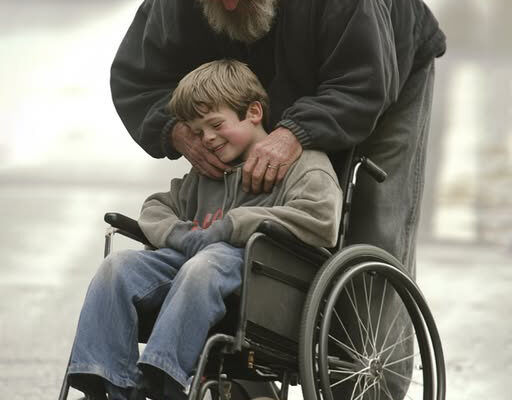I was playing my flute on the corner of Clover and Pine, one of those busy intersections where cars line up at the light, their drivers glancing in every direction except mine, pretending they don’t see me. It was a chilly, overcast day, the sky hanging low with gray clouds that threatened rain at any moment. The wind cut through my thin coat, and I pressed my instrument tighter to my lips, letting the melody carry me somewhere else in my mind.
My name is Morgan. I’m fifty-three, and I’ve been living on the streets for almost eight years now. It started with losing my apartment after a work accident cost me my mobility and eventually my job. The details get messy, but basically, I couldn’t cover my bills, I had no family left to turn to, and so I ended up in a cramped shelter. When even that shelter lost its funding, I found myself sleeping under the old railway bridge at the edge of town.
Yes, I’m homeless. And yes, I’m disabled. I have a degenerative condition in my spine and hips that makes every movement an exercise in pain management. At first, I tried to remain hopeful that the system would help me out, but it turned out social services had too many people to handle. My appointment times got pushed, phone calls unreturned. I guess I fell through the cracks.
Somehow, I didn’t let bitterness consume me. I had one thing to cling to: my flute. I’ve played since I was ten. My father gave me the flute as a birthday present, telling me that music was the language of hope. And that’s what I do. I cling to hope, busking at street corners. Usually, passersby spare me a glance. Some drop a coin or two into the battered hat I lay on the pavement. Often, they walk by quickly, as if afraid to get too close.
That day was shaping up to be another one of those days: me, my flute, a handful of coins, a stiff wind, and a strange mixture of exhaustion and acceptance in my chest. Around noon, I paused to rest my lips and catch my breath. My back was throbbing, and I tucked the flute under my coat for warmth. That’s when a small voice called out from behind me.
“Hey, mister.”
I turned carefully. Every movement was a risk that my spine would spasm, leaving me gasping. But the voice belonged to a boy, maybe eight years old. He wore a bright red cap and sat on a folding wheelchair that looked too small for him, his skinny legs poking out from under the blanket on his lap. Next to him stood an older woman—his mother, I guessed—her face drawn with stress, as if life had hammered her one too many times.
“Hello,” I greeted, giving a small smile. “Something I can do for you?”
The boy beamed at me, brown eyes wide with curiosity. “I heard your music. It sounded beautiful. My name’s Caleb. Can you play something else?”
I hesitated. Usually, people told me to keep quiet or move somewhere else. This boy actually wanted me to play? The mother, whose name I’d soon learn was Heather, placed a gentle hand on his shoulder. “We can’t stay long, Caleb,” she said. “We have to get to the clinic by two.”
“Just one song, please,” he insisted, looking back at me with a grin that sparked a forgotten warmth in my chest.
So I lifted the flute to my lips and began a soft tune, an old lullaby I’d taught myself in the early days of my homelessness. Something about it always stirred an ache in my heart, but it also soothed me, reminding me that there’s still beauty in the world. The boy sat transfixed, eyes shining. His mother looked on, her gaze flicking between me and her watch, torn by her schedule but not wanting to yank her son away from the only brightness he’d seen all day.
When I finished, the boy clapped softly. “That was amazing,” he murmured.
His mother dug in her pocket and retrieved a single dollar bill. She offered it to me with an apologetic smile. “I wish I could give more,” she said. “That was truly lovely.”
I shook my head. “Keep your money,” I said gently. “I can’t take that from you, not if you need it for the clinic or for him.”
She hesitated. “Please, let us. You gave us something nice. This might be all we can offer in return.”
Reluctantly, I accepted the dollar. But a pang in my chest told me the mother, and the boy, they needed help more than I did. Then again, I had no real means to help them; I was basically scraping by, busking for coins.
“Do you live around here?” I asked softly, curious about their story. The mother gave a small nod, but her eyes were guarded. “Not far,” she said. “In an apartment. We come downtown sometimes for appointments. Today we’re checking his legs again. The doctor says…” She trailed off, her voice thick with worry.
She didn’t need to finish. The boy couldn’t walk. Or if he could, it wasn’t enough to get around by himself. The old wheelchair he was in had squeaky wheels and a bent footrest, definitely secondhand. My heart squeezed, remembering my own predicament: a battered wheelchair had been my lifeline before I lost it to a robbery at the shelter. Now, I mostly relied on cane or just forced myself to move slowly, ignoring the pain. But the memory of having the right chair was a game-changer for me once.
I could see the tension in the mother’s posture. She looked so tired, so bone-deep weary, as though she’d faced a thousand closed doors.
“I hope the appointment goes well,” I said with genuine warmth. “The boy, he’s got a real spark.”
She gave me a watery smile, eyes shining with unshed tears. “He’s the best thing that ever happened to me,” she whispered. “I only wish… I only wish I had enough money to get him the wheelchair he really needs. This one’s from a rummage sale. It barely fits him, but we do what we can.”
We parted ways then. The boy waved goodbye, his face still lit with excitement from hearing the flute. I watched them go, my mind stirring with empathy.
In the following days, I kept playing at my usual spot. The memory of that boy’s bright grin stuck with me, and the mother’s exhausted eyes haunted me. The city bustled on, indifferent to those who struggled at its fringes.
My own life was a daily challenge. The shelter I used to rely on had closed. I occasionally stayed in a makeshift tent under an old overpass. My spine’s condition worsened, leaving me less mobile. The meager coins I earned from busking barely covered my medication or new cane tips. And I had no illusions about any miracle happening.
Yet, every time I thought about that mother and child, I felt a tug. I’d get a flashback to when I once had a functional wheelchair, back in the early days of my disability. That chair was stolen, but oh, how it changed my life for the few months I had it. Freed me from constant agony, gave me a semblance of independence. If only I still had it.
A week passed, then two. The weather turned even colder, an early winter creeping in. One evening, as I lingered past my usual time, trying to gather a few extra coins, I spotted them again—Heather and Caleb. She recognized me, offered a small wave, and steered the squeaky wheelchair over.
Caleb beamed. “Mr. Flute Man!” he exclaimed. “I was hoping we’d see you again.”
I grinned. “Me too, kiddo.”
Heather looked worn out, but her expression softened as she addressed me. “He’s been talking about you nonstop, asking if we’d find you here.”
I crouched down beside Caleb. “How are you doing, buddy?”
His face fell. “The doc said I might walk someday if I get better therapy and a better wheelchair to build my strength. But we can’t afford it, so… I guess it’s not happening soon.” He tried to act brave, but disappointment seeped through his tone.
I swallowed, my chest tight. “Don’t lose hope. You never know what might happen.” My eyes flicked to his battered chair, wheels squeaking with every slight motion. “Take care, okay?”
They left, heading off into the swirling wind. My mind churned, thoughts swirling faster than the breeze. The memory of my own stolen wheelchair stung. I remembered the sensation of rolling along the sidewalk with minimal pain, how that had let me feel a shred of normalcy.
I caught a glimpse of my reflection in a shop window, hunched with my cane. My mind wrestled with a wild, impossible idea. Could I possibly help them get a new wheelchair? My bank account was basically empty. Even secondhand chairs cost hundreds, at least. And I was in no position to do that. Then again, that boy’s future weighed on me. Had I not also once hoped for a “miracle cure,” only to realize it never came?
The next afternoon, I approached a local charity group. They recognized me from the soup kitchen. I inquired if they had any spare wheelchairs or medical equipment. The staff rummaged through their storerooms, shook their heads. “Sorry,” they said. They were short on everything. My shoulders slumped.
Days bled into each other. I’d mostly let go of the idea, until an older gentleman busked near me—a guitarist who also had been on the streets a while. He overheard me talking to a volunteer about the wheelchair issue and told me there was a rummage basement downtown that sometimes had old medical supplies. My heart soared at the chance.
I limped my way there, every step a brutal ache. Inside the dusty basement, among the shelves of mismatched junk, I found, unbelievably, a used wheelchair. My hopes rose and crashed in the same breath. The seat was tattered, the wheels somewhat bent, but the price was $80, which might as well have been $800 for me. My pockets barely had $10. The man in charge said no negotiations, no freebies.
I left with tears burning my eyes, frustration flooding me. But I refused to quit. Over the next week, I saved every coin, went without dinner some nights, prayed for bigger tips. My daily pain soared with my extended busking hours. Eventually, I scraped together $83. Enough for that battered wheelchair. I felt a nervous thrill, as though I was doing something bigger than myself.
I nodded, blinking away tears. “Absolutely. It showed me that kindness can go around in a circle. That day, it felt like I was giving up everything, but it gave me more than I lost.”
He reached out and patted my shoulder. “You gave me hope. And you got hope in return.”
A small chuckle escaped my lips. “Exactly.”
Late that evening, as the setting sun bathed everything in gold, I found a quiet spot near the water’s edge to play my flute. The new wheelchair let me roll right up to the shoreline. The rippling reflections of orange and pink danced on the lake’s surface. I played a lullaby, soft and haunting, letting the notes drift across the water.
In my mind, I pictured that first moment in the city square, how I never imagined a homeless man with a flute could do anything beyond scraping by day to day. Then how an 8-year-old boy in need of mobility had turned my entire worldview inside out. The circle completed by the gift from that same boy five years later. This was life’s quiet poetry at work.
So that’s how a random encounter between a homeless, disabled flutist—myself—and a child named Caleb started a chain reaction we never could have predicted. My sacrifice, giving up that wheelchair so he could walk, opened up a future for him. And in time, he found a way to open up a future for me. In giving him the freedom to move, I gained my own freedom in the form of a new wheelchair and a shot at living a better life.
Looking at the shimmering lake, I whispered a thank-you to life, to music, to human compassion. Then I lifted the flute to my lips again and played a gentle tune that was part gratitude, part yearning, part joy. The melody wound through the trees, across the water, and into the heart of anyone who might be listening.
In a world so often filled with hardship, it’s these moments of kindness that remind us of our shared humanity. We might each be broken in some way—physically, emotionally, financially—but if we open our hearts, we can fill those cracks with love and support each other along the way.
At last, night fell, and I packed my flute carefully. I turned my wheelchair around and headed back toward the lights of the city. Skipper, my loyal old dog, waited for me in my small rented room. My body ached, but my soul felt light. Tomorrow, I’d see Caleb again, maybe teach him the first notes on a spare flute I’d found. A new day. A new chance.
And all of it sprang from a single act of compassion: me handing my old wheelchair to a boy who needed it more than I did, though I wasn’t sure if I’d survive the sacrifice. Turned out, I did more than survive. I found a piece of my own redemption, a reason to keep going. Something beautiful in the midst of the struggle. And that… that was a gift beyond measure.


